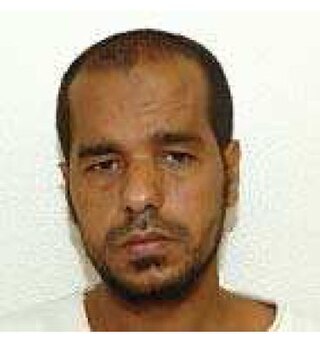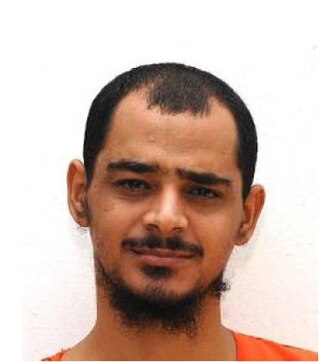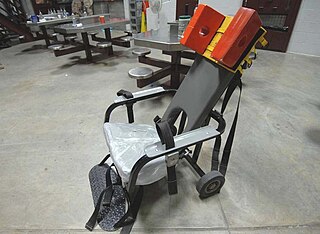
Omar Ahmed Said Khadr is a Canadian who, at the age of 15, was detained by the United States at Guantanamo Bay for ten years, during which he pleaded guilty to the murder of U.S. Army Sergeant 1st Class Christopher Speer and other charges. He later appealed his conviction, claiming that he falsely pleaded guilty so that he could return to Canada where he remained in custody for three additional years. Khadr sued the Canadian government for infringing his rights under the Charter of Rights and Freedoms; this lawsuit was settled in 2017 with a CA$10.5 million payment and an apology by the federal government.
Ahcene Zemiri, also known as Hassan Zumiri, is an Algerian citizen who was for seven years a legal resident of Canada, where he lived in Montreal. He and his Canadian wife moved to Afghanistan in July 2001. They were separated when trying to leave in November 2001 and Zemiri was arrested and turned over to United States forces. He was transferred to the United States Guantanamo Bay detention camp in 2002, where he was detained for eight years without charge.

Salim Ahmed Salim Hamdan is a Yemeni man, captured during the invasion of Afghanistan, declared by the United States government to be an illegal enemy combatant and held as a detainee at Guantanamo Bay from 2002 to November 2008. He admits to being Osama bin Laden's personal driver and said he needed the money.
Peter E. Brownback III is a retired military officer and lawyer. He was appointed in 2004 by general John D. Altenburg as a Presiding Officer on the Guantanamo military commissions. The Washington Post reported: "...that Brownback and Altenburg have known each other since 1977, that Brownback's wife worked for Altenburg, and that Altenburg hosted Brownback's retirement party in 1999."

Abdul Zahir is a citizen of Afghanistan, who was held in extrajudicial detention in the United States' Guantanamo Bay detention camps, in Cuba. He was the tenth captive, and the first Afghan, to face charges before the first Presidentially authorized Guantanamo military commissions. After the US Supreme Court ruled that the President lacked the constitutional authority to set up military commissions, the United States Congress passed the Military Commissions Act of 2006. He was not charged under that system.

Adnan Farhan Abdul Latif, also known as Allal Ab Aljallil Abd al Rahman, was a Yemeni citizen imprisoned at the U.S. military prison at Guantanamo Bay, Cuba, from January 2002 until his death in custody there, ruled a suicide.
Adel Fattough Ali Al Gazzar is a citizen of Egypt formerly held in the United States Guantanamo Bay detainment camps, in Cuba. The Department of Defense reports that he was born on October 22, 1965, in Cairo, Egypt.

Mohammad Ahmed Abdullah Saleh Al Hanashi was a citizen of Yemen, held in extrajudicial detention in the United States Guantanamo Bay detainment camps, in Cuba. Al Hanashi's Guantanamo Internment Serial Number was 78. The Department of Defense reports that Al Hanashi was born in February 1978, in Abyan, Yemen.
Mohammed el Gharani is a citizen of Chad and native of Saudi Arabia born in 1986, in Medina. He was one of the juveniles held for seven years at the Guantanamo Bay detention camp where they estimated his age to be 15–16, though Al Jazeera reports his age to have been 14 at the time of his arrest. Human Rights lawyer Clive Stafford Smith identified el Gharani as one of a dozen teenage boys held in the adult portion of the prison.

Mohammed Ahmad Said Al Edah is a citizen of Yemen who was held in the United States' Guantanamo Bay detainment camps, in Cuba, for fourteen and a half years. His Internment Serial Number is 33. Joint Task Force Guantanamo counter-terrorism analysts estimate he was born in 1962, in Hay al-Turbawi Ta'iz, Yemen.
Abdul Rahman Ma'ath Thafir al Amri was a citizen of Saudi Arabia, held in extrajudicial detention as an enemy combatant in the United States Guantanamo Bay detainment camps, in Cuba.
The United States Department of Defense (DOD) had stopped reporting Guantanamo suicide attempts in 2002. In mid-2002 the DoD changed the way they classified suicide attempts, and enumerated them under other acts of "self-injurious behavior".
Abdullah Tabarak Ahmad is a citizen of Morocco, who was held in extrajudicial detention in the United States Guantanamo Bay detainment camps, in Cuba.

Ayoub Murshid Ali Saleh is a citizen of Yemen who was held in extrajudicial detention in the United States Guantanamo Bay detainment camps, in Cuba. His Guantanamo Internment Serial Number is 836. The Department of Defense reports that he was born on April 29, 1978, in Usabee, Yemen.
The Center for Constitutional Rights has coordinated efforts by American lawyers to handle the habeas corpus, and other legal appeals, of several hundred of the Guantanamo detainees.
Abdul Razaq, a young Afghani man, was the first detainee to be released from the U.S. military detention facility at Guantanamo Bay, Cuba. Razaq was released after four months when officials determined that he was of no further intelligence value, nor a threat to the United States, and was affected by schizophrenia. Razaq was repatriated on May 11, 2002. Newsweek conducted an interview with Razeq in a high security mental institution on May 20, 2002.








